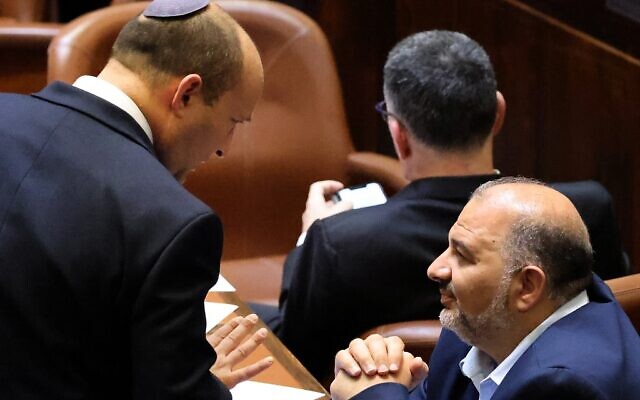Former prime minister Naftali Bennett praised Ra’am leader Mansour Abbas for being “brave” and joining his government, and said he hoped the incoming coalition would succeed in uniting Israeli society, in a New York Times op-ed published Sunday.
“We called ourselves a good-will government. We proved to ourselves and to those outside our coalition that people with radically different political opinions can work incredibly well together. The world is more polarized than ever. The model we presented was one of cooperation and unity. Of transcending your tribe for the good of your nation,” Bennett wrote.
The right-wing politician singled out Abbas for particular praise, saying that while he initially had a negative opinion of the Islamist party chief, it quickly changed.
“I discovered a brave leader just about my age who turned out to be something of a mensch,” Bennett wrote.
“We are both men of faith and quickly agreed that whatever theological disagreements may exist between Judaism and Islam, we will let God handle those. We will work together here and now to provide better education, better jobs and safer streets for Israelis and Arabs,” Bennett said.
Get The Times of Israel's Daily Edition by email and never miss our top stories
“A new government is now being formed in Israel, and I hope its leaders understand that the single biggest challenge for Israel is keeping all parts of Israeli society together,” he wrote.

Prime Minister Naftali Bennett (L) talks with Mansour Abbas, head of the Islamic Ra’am party, during a special session to vote on the new government at the Knesset in Jerusalem, on June 13, 2021. (Emmanuel Dunand/AFP)
Bennett said that the reason his government managed to pass legislation was the “70/70 rule,” which he said reflected the fact that around 70 percent of Israelis agree on 70% of the issues.
“We all agree that we need better trains and roads, better education, more security and a lower cost of living. However, we disagree on the Israeli-Palestinian conflict, religion and state and the desired nature of our legal system,” he wrote.
“So my government focused on getting the 70 percent done, as opposed to endlessly wrangling over the issues we didn’t agree on. We all agreed that this government will neither insist on Israeli sovereignty for territories nor hand them over to Palestinians,” according to Bennett. “Similarly, we decided we would not legislate on any disputed religious or legal matters.”
He added said that by not touching the most politically sensitive issues, his government of lawmakers from across the political spectrum could begin to view each other “as decent people working for the good of Israel and not as the demons we had been calling each other.”
The former prime minister admitted that his government’s failures led to its downfall, but did not mention the failed election campaign.
“My government did a poor job fending off the enormous amount of misinformation that was being spread across Israel and blind sectarianism. This campaign succeeded and brought my government to its end,” he said.
“Though my government operated for only a year, I believe we imprinted a unique image and model of how a highly polarized society can cooperate,” he wrote. “That beautiful image, once engraved in hearts and minds, cannot be easily erased.”
Earlier this month, Bennett officially submitted his resignation as alternate prime minister.
His resignation terminated a decade-long career in politics that was capped — and seemingly doomed — by a surprise ascension to the premiership last year.

File: (L-R) Yisrael Beytenu leader Avigdor Liberman, Yesh Atid leader Yair Lapid, Yamina chair Naftali Bennett, New Hope chair Gideon Sa’ar, Blue and White head Benny Gantz, Ra’am chair Mansour Abbas, Labor head Merav Michaeli and Meretz leader Nitzan Horowitz at a meeting of the heads of the would-be-coalition in Tel Aviv, June 6, 2021. (Ra’anan Cohen)
Bennett handed the country’s leadership to outgoing Prime Minister Yair Lapid — honoring a power-sharing agreement they had signed — and announced that he would be leaving politics after their diverse coalition collapsed and new elections were called in June.
In a parting statement, Bennett called on the expected new right-wing government not “to trample” the left, and also urged left-wing Israelis not to despair over the election outcome that saw Likud’s Benjamin Netanyahu’s right-wing bloc secure a majority with 64 seats.
“The results are not the end of the country,” Bennett said, adding that he believed incoming ministers would work for the general public “and not a specific community.”
He appealed to the victorious right-religious bloc: “Respect the losing side. There is no need to trample or run over anyone.”
Since stepping down, Bennett has spent time giving volunteer lectures to students and soldiers.
He has also been booked to give several lectures to Australia’s United Israel Appeal as part of the group’s 2023 campaign gala to be held across the country throughout February, the Australian Jewish News reported last week.


